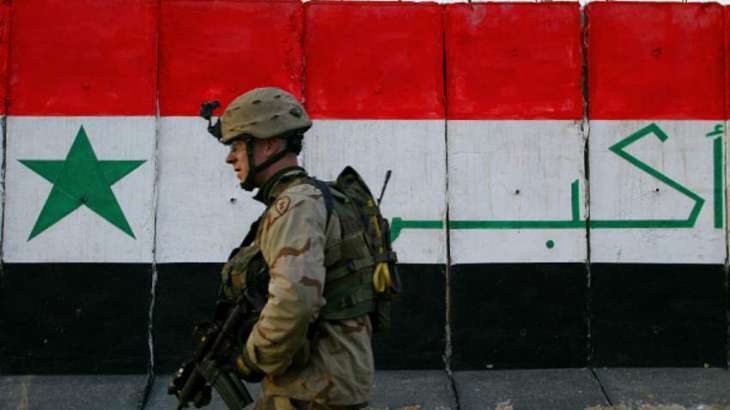After the United States withdraws troops from Iraq for the second time in a decade by year end, the vacuum is likely to be filled by militant groups, experts told Sputnik
MOSCOW (Pakistan Point News / Sputnik - 18th December, 2021) After the United States withdraws troops from Iraq for the second time in a decade by year end, the vacuum is likely to be filled by militant groups, experts told Sputnik.
The US pulled its last soldier out of the Middle Eastern country on December 18, 2011, fulfilling then-President Barack Obama's pledge to end the Iraqi conflict. The move, however, helped bring about the rise of Islamic State (a terrorist group, outlawed in Russia). This in turn prompted Washington to resume military operations in Iraq in 2014 to push back against the terrorist movement.
In late 2017, IS was declared defeated, but counterterrorism operations continued. This July, Washington and Baghdad announced the end of US combat mission in Iraq, saying that there will be no American forces in a combat role in the country by December 31. At the same time, the US will keep 2,500 troops stationed in an advisory capacity.
The US response to the IS threat has proven successful in bringing down a group that was seemingly on the verge of completely overrunning Iraq. The operation was important not simply in terms of military presence on the ground, but also as an encouragement to all parties that opposed the IS, according to Kanishkan Sathasivam, a professor in the Political Science department at Salem State University.
"I would assess the US redeployment in 2014 as having been better than nothing but still not nearly as good as if the US had not withdrawn its forces in 2011 in the first place," Sathasivam said.
When asked to compare the second US mission to Iraq with its campaign in Afghanistan, the expert said that unlike Afghanistan, in Iraq, Washington could rely on people who intended to create "a new, stable, moderate, democratic country."
"The US never truly had such a partner in Afghanistan, especially within that country's political circles," Sathasivam explained.
Gareth Jenkins, a non-resident senior research fellow with the Joint Center Silk Road Studies Program and Turkey Center at the Institute for Security and Development Policy in Stockholm, agreed that US deployments played a key role in bringing down Islamic State, but also warned of the tendency of such interventions to fuel public support for radical groups.
"And it is difficult to say that the central government and the institutions of the Iraqi state have been sufficiently strengthened by the US military deployment - or that the 'training' and 'advice' that the US says that it is providing will enable Baghdad to address all of the country's security challenges," Jenkins stressed.
The risk of other militant groups replacing IS is on the mind of many observers of Middle Eastern affairs. After all, the now-defeated movement itself emerged from the power vacuum left by the original US withdrawal in 2011.
Sathasivam took a pessimistic view of the matter, saying that "it will have the same impact as the previous US withdrawal, namely that foreign forces will become stronger inside Iraq."
According to the expert, the difference is that instead of IS, it will be Iran-sponsored groups who will reap the benefits of America withdrawing, and the presence of a small force will be more of a political gesture than a military one.
"Furthermore, there are already reports that even those 2,500 troops may be withdrawn in the first half of next year," Sathasivam added.
His stance is echoed by Jenkins, who noted that the US tends to stage military interventions to address specific threats without dealing with the circumstances that create them.
"I think the US withdrawal of combat troops from Iraq will have reinforced the impression among militant anti-US groups in the region and farther afield that, if the US stages a military intervention against them, they do not need to defeat the US forces in order to get rid of them - they just have to be patient and wait," Jenkins said.
Meanwhile, Roderick Kiewiet, a professor of Political Science at the California Institute of Technology, thinks that leaving a small number of troops makes sense as a goodwill gesture, adding that, unlike Afghanistan, Iraq has a real government and economy, and its various groups are capable of reaching an agreement most of the time.
WASHINGTON'S middle EASTERN POLICY UNDER SCRUTINY
As the US withdraws from Iraq, its approach to the region is facing criticism of being somewhat haphazard, less about dealing with more systemic issues and more about tackling problems at hand.
"US foreign policy in the Middle East tends to be reactive rather than preventative. It mobilizes its resources to try to address what are symptoms of problems in the region rather than trying to address the issues which create the symptoms," Jenkins expounded, adding that he does not see any signs of US willingness to deeply engage with issues plaguing the region.
Kiewiet acknowledged that the Joe Biden administration seems to have no major innovations in its policy toward the Middle East, but said that "any day that the US president or State Department has nothing to say about the Middle East is a good day."
Sathasivam, on the other hand, criticized American foreign policy as being poorly designed and leading to more instability, war and suffering.
"I especially deplore the US approach of walking away from longstanding friends and allies in the region, not just countries and governments but also groups like the Iraqi Kurds. I expect Iran will be the main beneficiary of current US policy in the Middle East, and that will be very bad for everyone else in the Middle East," the expert concluded.




